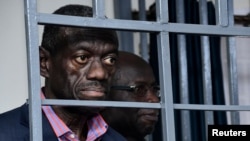Tensions are high in Uganda after opposition leader Kizza Besigye, a long-time opponent of Ugandan President Yoweri Museveni, disappeared in neighboring Kenya to resurface later in a military court in Uganda’s capital, Kampala, accused of weapons possession and other serious offenses and possibly facing the death penalty.
Besigye was detained on November 16 in Nairobi and held incommunicado for four days, Reuters reported.
The United Nations High Commissioner for Human Rights Volker Türk called the detention an “abduction” coordinated between Kenyan and Ugandan governments.
"Such abductions of Ugandan opposition leaders and supporters must stop, as must the deeply concerning practice in Uganda of prosecuting civilians in military courts.”
The British rights watchdog Amnesty International used similar language, saying Besigye was illegally abducted and currently held at the Luzira Maximum Security Prison.
The U.S. Bureau of African Affairs said on X that the U.S. is “closely following the abduction and transitional rendition of civilian political figures” from Kenya to Uganda, calling for their full legal protection.
Korir Sing’Oei, Kenya’s Ministry of Foreign and Diaspora Affairs principal secretary, also said Besigye was abducted, but claimed his government had no hand in the matter. He said the case is under investigation.
“Kenya is a safe haven for many people and has been for many years and will be for years to come," Sing’Oei said.
That is false.
State-sanctioned abductions, refugees included; extrajudicial killings; torture and enforced disappearances have surged in Kenya, according to independent reports by international observers, the United Nations, local rights groups and investigative journalists.
The Kenyan government reportedly detains political dissidents and opposition figures seeking refuge and hands them over to authoritarian governments despite the risks of persecution.
On October 18, the Kenyan security agencies detained four Turkish asylum-seekers and repatriated them to Turkey.
Sing'Oei confirmed on October 21 the "four had been residing in Kenya as refugees," but that the Kenyan government acceded to "the request of the government of Türkiye" because of "robust historical and strategic relations" with that country.
Kenya has a history of abductions of Turkish nationals in its territory. In May 2021, the Kenyan security forces and Turkish spies kidnapped Selahaddin Gulen and deported him to Turkey, despite a court order banning the extradition.
Those actions by the Kenyan government violate the United Nations Refugee Convention, which stipulates that “no one shall expel or return ("refouler") a refugee against his or her will, in any manner whatsoever, to a territory where he or she fears threats to life or freedom."
The Kenya National Human Rights Commission, an independent watchdog, reported in October that “Kenya is witnessing an unprecedented wave of abductions and killings targeting various individuals.”
“Since June 2024, the commission investigated 60 cases of extrajudicial killings and 71 cases of abductions and enforced disappearances,’ the commission said, implicating the Kenyan police and other security agencies.
Hundreds of young people remain missing since the June demonstrations led by Generation Z Kenyans, a demographic cohort of educated unemployed youth who protested a new bill that would impose unaffordable taxes on most vulnerable citizens.
New York-based Human Rights Watch reported in November that at least 73 were killed during the protests by the police, stating the number “could be much higher, as more bodies were found later, and the bodies of other people whose killing was witnessed by others at parliament and elsewhere have yet to be found.”
On November 7, U.S. Secretary of State Antony Blinken called on Kenyan President William Ruto to conduct ‘’full accountability for security forces reportedly involved in protest violence and ongoing abductions.”
Late July, Reuters reported that the Kenyan authorities deported to Uganda “36 members of the Forum for Democratic Change (FDC), one of Uganda's biggest opposition parties."
Tortured and injured while still in Kenya, they reportedly were later charged in the military court in Kampala with terrorism-related offenses.
According to court documents, they were accused of traveling to Kenya "for the purpose of providing or receiving terrorist training."
The lawyer for the accused told the court his clients went to Kenya to “take part in a leadership and governance training in Kisumu city, Western Kenya.’’
Human rights groups say Kenya, once seen as a beacon of hope for people fleeing from political persecution, human rights violations or war, has slowly turned into a persecution ground.
On October 23, 2022, the Kenyan police shot and killed TV Pakistan’s top investigative journalist Arshad Sharif, who was in Kenya after fleeing from the Pakistan authoritarian regime.
The U.S. State Department’s country report on human rights in Kenya cited evidence of “extrajudicial killings; enforced disappearances; torture or cruel, inhuman, or degrading treatment or punishment by the government; harsh and life-threatening prison conditions; arbitrary arrest or detention,’’ and serious restrictions on freedom of expression and media freedom.
“Impunity was a problem at all levels of government,” the report said.
Rights watchdogs also report an increased number of femicide cases in Kenya, while the authorities claim the killings of women are not gender related.
Kenya’s Directorate of Criminal Investigations said 97 women had been killed in the last three months. Most of the murders remain unsolved, the perpetrators referred to as unknown people. The deaths of the women were “not gender-based,” the directorate claimed.
Last week, Ruto condemned the rise of femicide cases in his country and asked citizens to unite to protect women from gender-based violence. Yet on November 25, the Kenyan police used tear gas against peaceful anti-femicide protesters in the capital, Nairobi.





